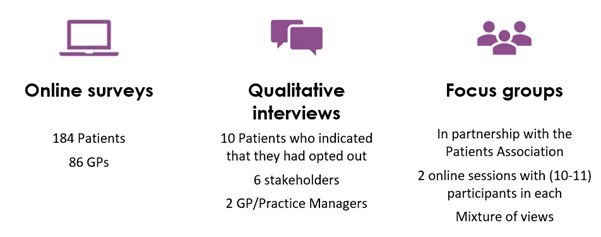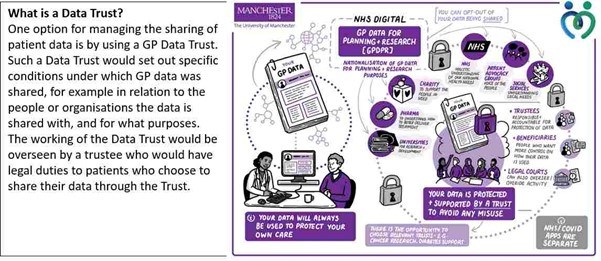
CASE STUDY: General Practice Data Trust pilot study - listening to our people
In May 2021, NHS Digital announced that they would collect patients’ primary care (GP) data so that it could be used in a non-identifying form in medical research and planning. Over a million people opted out of the programme, prompting NHS Digital (external website) to delay it to provide more time to speak with people about their concerns.
By the University of Manchester research team: Professor Sarah Devaney, Professor John Ainsworth, Professor Søren Holm, Dr Catherine Bowden, Dr James Cunningham and Dr Nigel Burns.
In late 2022, researchers based at The University of Manchester, began running the General Practice Data Trust (GPDT) pilot study (external website), funded by the Data Trusts Initiative (external website), to find out why people opted out of sharing their GP data, and to explore whether a Data Trust would provide a method of sharing their GP data that would be more acceptable.
Debates on sharing data often focus on the potential risks involved rather than the potential benefits. It is also widely acknowledged however that sharing health data is crucial for the development of medical treatments and a wide range of data is needed if those treatments are to be effective across the population. The medical response to the COVID-19 pandemic has been a powerful reminder of this.
Research shows (external website) that in general people support the idea of sharing their data to improve healthcare. However, the scale of the opt-out from NHS Digital’s programme tells us that there are concerns that need to be addressed before patients have sufficient confidence to contribute their data to this beneficial resource.
Activities
To understand why so many people opted-out of sharing their data we ran two surveys, one for patients and one for GPs. We also interviewed patients who told us that they had opted out of sharing their GP data, interested stakeholders including campaign groups, and GPs and Practice Managers. In addition, we conducted two focus group sessions in partnership with the Patients Association.


The fantastic response we had to these activities has provided valuable data for us to explore the reasons why people opted out of sharing their GP data, ask GPs about their role in data sharing, and explore views on an alternative system known as a Data Trust.


Outputs
The participants in our study told us that they opted out of sharing their GP data because they did not trust that their data would be handled appropriately. They felt that they were not given enough information about what their data would be used for, who would have access to it, what the benefits would be, and what safeguards would be put in place. This lack of information, the short time they were given to decide, and the opt-out nature of the decision, made them feel that their right to decide what their data is used for was not being respected.
The information our participants have shared with us has helped us to understand how patients feel about their health data and this is helping us to design ways in which patients can have the control they want over their data.
You can see some of the results of our study so far by following these links:
Patients want more control over how their data are shared (external website)
Animation of Technical Data Flow (external website)
Blog post: Involving patients in decisions about health data sharing | Accelerate Programme (external website)
Trust is the key to healthcare data sharing (external website)
Our analysis of the data is continuing and we hope to be able to share some more results soon!
Next steps
In the next stage of the project we will be working with the Greater Manchester Care Record (external website) to explore how patients can have more input into how their health data is used for research and planning purposes.
This work from the University of Manchester is one example of how partners across the region are helping us achieve digital ambitions around building responsible, data driven public services.



